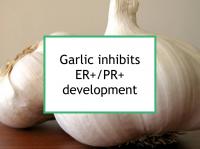A new study has reported that organosulfur compounds found in allium vegetables such as onions and garlic inhibit breast cancer cell growth and proliferation by interfering with the cell cycle. The study was designed to investigate the mechanism of action by which organosulfur compounds exert chemopreventive effects.
For many years, cell and animal studies have found that organosulfur compounds such as diallyl sulfide are able to inhibit the proliferation of various types of tumor cells. However, despite recent advances, the specific molecular mechanisms involved in organosulfur compound activity are not clear. Given the antiproliferative effects of these compounds observed in cancer cells, the authors postulated that organosulfur compounds might target the cell division cycle 25 (Cdc25) phosphatases. Cdc25 phosphatases are essential enzymes of the cell cycle.
Study results
The authors report that their experimental findings indicate that Cdc25 phosphatases are in fact possible targets of naturally occurring polysulfides, thereby contributing to their anticancer properties. Tetrasulfides occurring naturally in garlic and onions were found to have inhibitory activity towards human Cdc25 phosphatases. In addition, the tetrasulfides were found to significantly suppress the growth of MCF-7 human breast cancer cells (which are responsive to a number of treatments), as well as vincristine-resistant Vcr-R breast cancer cells (which are chemotherapy resistant). The authors conclude that the observed antiproliferative effect of organosulfur compounds found in allium vegetables appear to be associated with G2-M cell cycle arrest.
